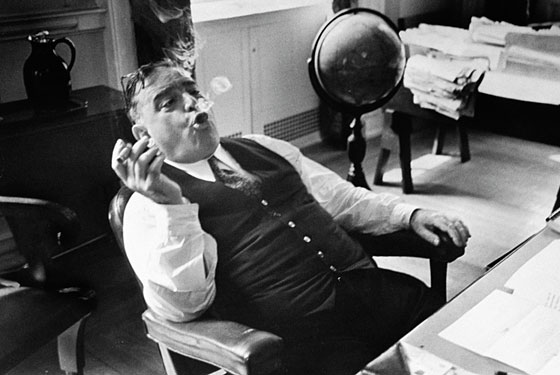 |
Fiorello La Guardia at City Hall, October 1945.
(Photo: William C. Shrout/Time Life Pictures/Getty Images) |
Chris Smith: What qualities make a great mayor, let alone the best mayor?
John Mollenkopf: How could you be a great mayor without doing a good job of delivering basic services? And the unique challenges of the time: The extent to which the mayor understands those and responds to them creatively is the other half of being great.
Bob Hardt: When you’re a kid, you imagine what would happen when Superman fights Batman, who would win. There’s a similar kind of fun to comparing mayors. How would, for example, Giuliani do if he were coming in in 1978 versus ’94? Or how would Dinkins have done, had he come in as the Bloomberg after Giuliani?
Jennifer Cunningham: It’s all context—the right person and the right time come together, and you’re a great mayor. And if you’re not, well, shit happens.
Rev. Al Sharpton: I think what separates good mayors from great mayors is when they’re tested in a real crisis.
Mollenkopf: And symbolic leadership: expressing the city’s values, the bully-pulpit side of it.
Smith: Rudy Giuliani’s allies say he saved the city twice—by driving down crime and then by rallying spirits after September 11. Is Giuliani the best ever?
Sharpton: I am probably the most anti-Giuliani guy in the room, and I think Giuliani set the right tone after 9/11. But even a broke clock is right twice a day.
Cunningham: It might have been a moment of greatness, but I just don’t think you can consider somebody who left so many people feeling more than shut out—disrespected, unimportant.
Mollenkopf: I’m almost speechless at the idea that I could say something admiring of Giuliani. But if you assess the major changes in New York City that happened in the last 30 or 40 years to make this one of the safest big cities in the world, he was absolutely fundamental to making this city what it is.
Smith: Ed Koch steered the city through economic crisis and was a brilliant cheerleader.
Mollenkopf: If you could look only at Ed’s first term or the first half of his span, you would say something different from looking at the whole stretch.
Cunningham: I’m not suggesting it was of his own making, but Koch’s last term was plagued by the worst corruption. It was almost the beginning of the ethics plague that is still playing out.
Hardt: Race relations in the last five years of Koch were pretty lousy. Not necessarily because of him, but he was not the right person at the right time to really deal with a lot of issues that Dinkins tried to confront, also somewhat unsuccessfully.
Mollenkopf: Whatever you think of the Koch administration, the city and the state did put billions of dollars into rebuilding the subway system, and that’s one of the things that’s been fundamental to the turnaround of New York from the downward trajectory that it was on.
Smith: Conventional wisdom says we shouldn’t even discuss John Lindsay.
Sharpton: I remember growing up in the sixties and seventies in Brooklyn. I don’t really remember Wagner, but I remember Lindsay walking the streets in Bed-Stuy and Harlem. Now, we may have been in the toilet fiscally back then, but I don’t remember that because we’ve gone to hell and back ten times since then. But when you say John Lindsay, I have an endearing memory of him because he was a tall, lanky guy who had all the power, and he came to our community.
Cunningham: I also have to stick up for Lindsay. Look at not just what was happening with New York at the time but urban America, with white flight and really no safety net or an urban policy in this country. And if not for John Lindsay, this city would have been living through a situation probably much worse than what Detroit and Newark and other big cities wrestled with. I always thought it was amusing when Giuliani became “America’s mayor,” because America’s mayor was first John Lindsay. It’s just sort of a pet issue of mine. I think the best leaders are the ones who try to encourage people to have faith in public service, faith that government is a force for good, can do right by people. The people we saw go into the Lindsay administration—Mario Cuomo, Carl McCall, and a host of people who didn’t go on to be elected officials—they brought new energy to public service. And I do media for a living, and Lindsay used TV commercials that were pretty sophisticated for their time, the David Garth cinéma vérité, direct-to-camera stuff.
Hardt: PR-wise, Lindsay did everything right, especially his first term. But if you talk to the budget number crunchers of the world, they’ll just shake their heads and mutter, “Oh my goodness.”

